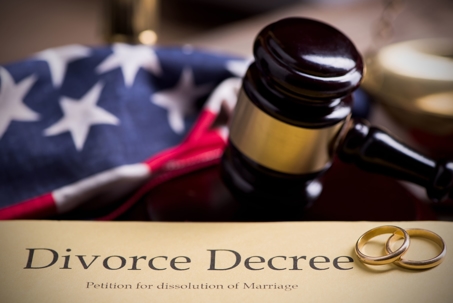When entering a divorce, you may come with preconceived ideas about the process and laws that govern your dissolution. You may have heard from friends, how their divorce action was handled, or watched a television program involving a dissolution of marriage. However, many people will learn that the information they received outside of a professional opinion is slightly twisted, or completely false. This is especially true for those engaged in military divorces. Therefore, your divorce attorney has gathered the most common myths surrounding military divorces to provide you with a better understanding of the process.
Myth: I will lose all my military benefits after my divorce.
Fact: The loss of military benefits depends on a few different factors. Military benefits given to former spouses is governed by the 20/20/20 rule and the 20/20/15 rule. These numbers respectively define the length of marriage between the military member and spouse, the length of military service, and the overlap in time of the marriage and military service. If you qualify under the 20/20/20 rule, meaning you were married for 20 plus years, the military member served for 20 plus years, and there was an overlap of 20 plus years between the marriage and military service, you will be able to retain all military benefits. This includes healthcare, ID cards, and commissary access. If your marriage only overlaps with the military service for a period of 15 years, you will be able to retain your health care benefits for a period of one year, but lose all other privileges. However, even if your marriage does not meet either of these time restrictions, there are still methods that can be used by your lawyer to ensure the loss of benefits is calculated into your divorce settlement.
Myth: I am entitled to half of my military spouse’s retirement and pension.
Fact: The amount a spouse is entitled to of a military member’s retirement or pension is dependent upon the length of the marriage. In order to calculate the appropriate amount a spouse is entitled to of a service member’s, TSP, retirement or pension the court will consider the length of service the military member has put in up until the date of divorce. The court will then determine the length of the marriage in relation to the military involvement. The court will divide the duration of marriage while involved in the military by the overall duration of service so far. For instance, if a military member has served for 15 months and has been married to their spouse for 10 of those 15 months, the spouse is only entitled to half of the amount of TSP, retirement, or pension acquired during those 10 months and not half of the entire term of service.
Myth: Service members and their spouses do not need civilian lawyers.
Fact: Although JAG officers are experienced in many different areas of law, and retain the same qualifications as private attorneys, in cases such as divorce it is important to have the assistance of an experienced private attorney. A divorce involves a great deal of specialized knowledge in order to provide competent representation. There are many pieces to a divorce that can be easily overlooked by an attorney with minimal experience in the field, this is especially true in military divorces. Therefore, we encourage you to seek outside counsel to ensure your rights are properly protected.
Divorces are a sensitive and complicated area in a person’s life and in order to suppress fear of the unknown, people attempt to gather as much information as possible. However, when doing this is it important that the information you receive is accurate and not commonly heard myths. Therefore, we encourage you to seek out professional legal counsel. Your attorney will be able to answer any questions you may have regarding the process and debunk any myths you may have heard.
Speaking to an attorney at our Pensacola office is free of charge, and we accept calls 24 hours a day, 7 days a week. Call us at (800) 822-5170 or complete an online contact form to get in touch with a member of our team today.

